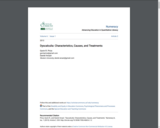
Developmental Dyscalculia (DD) is a learning disorder affecting the ability to acquire school-level
arithmetic skills, affecting approximately 3-6% of individuals. Progress in understanding the root causes
of DD and how best to treat it have been impeded by lack of widespread research and variation in
characterizations of the disorder across studies. However, recent years have witnessed significant growth
in the field, and a growing body of behavioral and neuroimaging evidence now points to an underlying
deficit in the representation and processing of numerical magnitude information as a potential core
deficit in DD. An additional product of the recent progress in understanding DD is the resurgence of a
distinction between ‘primary’ and ‘secondary’ developmental dyscalculia. The first appears related to
impaired development of brain mechanisms for processing numerical magnitude information, while the
latter refers to mathematical deficits stemming from external factors such as poor teaching, low socioeconomic status, and behavioral attention problems or domain-general cognitive deficits. Increased
awareness of this distinction going forward, in combination with longitudinal empirical research, offers
great potential for deepening our understanding of the disorder and developing effective educational
interventions.
- Subject:
- Education
- Special Education
- Material Type:
- Reading
- Provider:
- University of South Florida
- Author:
- Daniel Ansari
- Gavin R. Price
- Date Added:
- 03/18/2021